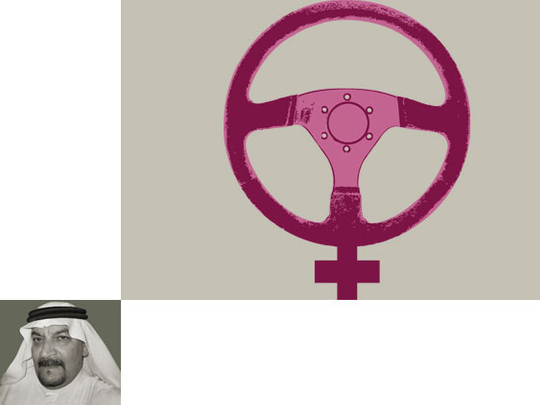
When a Saudi paper recently reported that the Saudi Crown Prince Nayef Bin Abdul Aziz had okayed the participation of the kingdom's women in the London Olympics to be held this summer, many Saudis saw it as a sign that such a significant concession would soon signal the end of many other hurdles facing Saudi women in their everyday lives.
As more and more Saudi women today have entered the workplace, the demands for freeing them from the dependency on a male will rise higher on the heels of the Saudi female Olympians.
On top of the list would be the right to drive their own vehicles. But one should not indulge in too much optimism.
I remember just over six years ago the Minister of Information declaring at the Jeddah Economic Forum that there was nothing in the laws preventing a woman from obtaining her driver's licence, a proclamation that was followed by a resounding chorus of approvals from the audience.
I also remember that encouraged by that bold statement from a minister in our government, the first thing the following day I made my way to the traffic department with the intention of submitting a driver's licence application for my wife, since I carried the weight of ‘male guardianship'.
And as it is the norm with most government-run bureaucracies, one does not waste too much time with the underlings who usually operate without much information or direction from the top.
And thus I found myself in the office of the district station commander, facing him and stating my clear intentions. His look was one of surprise and incredulity in that I could barge into his private office with such a bold demand.
You have to understand that such public servants expect the general public to stoop their shoulders and shuffle in meekly as they confront someone of authority, while they anxiously whisper their requests.
He was obviously not familiar with my manners, and after I had introduced myself, he asked me to have a seat. Declining his offer of a cup of tea, I stated that I was there to submit an application for a driver's licence for my wife and wanted to know what the procedure was.
"Well, we don't know anything about it, and there's nothing in our laws yet," he stated. "Where did you come up with such a notion?"
"The Crown Prince recently stated that the issue of women driving was a family matter, and the Minister of Information declared recently that there was no law preventing a woman from getting her driving licence, and that is precisely why I am here," was my reply. "That's all on the record, and as I am the head of my household I am pursuing this matter."
"Honestly, we have received no information or instructions yet from the ministry in Riyadh. And besides, they would first have to create driving schools for women before the process of licensing could begin."
Driving skills
"Yes, that would be necessary for those just beginning to learn. But my wife carries a driving licence from the state of California, and I am comfortable with her driving skills."
"Oh, I am sure of that. In fact I think women would make much better and safer drivers than men. But would you really allow your wife onto our streets?"
"That would be a matter of choice for her, now wouldn't it?" I responded.
"If and when she feels safe enough to venture out on her own, then it would be her decision and hers alone. Just getting the licence may not necessarily encourage her to get a dose of our roadside warriors. But so long as I, her husband, am agreeable, the option to take that first drive must be hers."
"Yes, but that would put her life in pointless danger. There are speedsters, traffic violators, and those that don't even know how to drive on our streets," he countered. "There's just no respect for traffic laws."
"Tell me about it, chief. But isn't that something your officers and patrolmen should be monitoring and then taking traffic offenders to task. I believe that falls under your jurisdiction, doesn't it?" I inquired as I got up to leave.
"Aaaah" he started to sigh, but before he could expel it all out, I shot him another one. "Now tell me chief, are you absolutely positive that there are no directives from Riyadh in your inbox relating to women's driving?"
On seeing his vigorous shake of the head, I made my way out, privately committing myself to take this as far as I could.
I tried and tried but went nowhere and under the weight of bureaucratic shuffling, I finally had to admit defeat.
Six years on and I still wonder if these announcements are purely cosmetic in nature and whether the real barriers facing women would ever come down.
Tariq A. Al Maeena is a Saudi socio-political commentator. He lives in Jeddah, Saudi Arabia.









